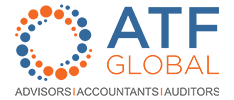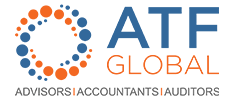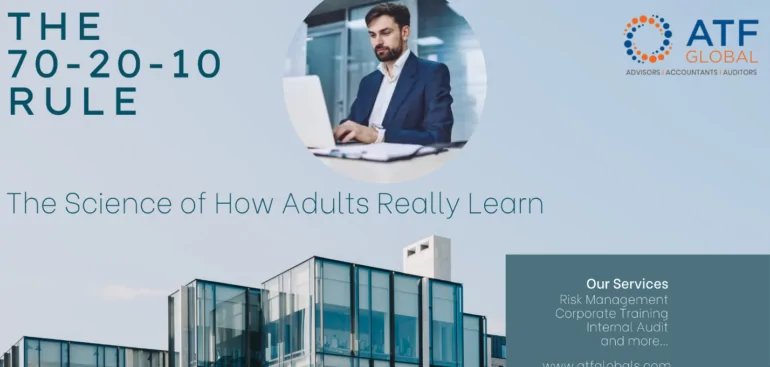It is a cliché but is a fact that in today’s rapidly evolving business landscape, continuous learning and development are critical for staying competitive, especially in dynamic markets like the UAE and KSA. This is more so because the Gurus of geopolitics & geo-economics are indicating Middle East to be the big thing, the center of economic activity.
At ATF Global, we understand the importance of effective corporate training, risk management, and internal audit practices in driving success.
That’s why we’re diving into a powerful framework that aligns perfectly with our mission: the 70-20-10 rule. This isn’t just another training fad; it’s a science-backed approach to how adults truly learn, and it can transform the way your organization approaches learning and development.
The 70-20-10 model is a learning and development (L&D) framework that describes how people learn and build knowledge. It suggests that learning occurs through a combination of three types of experiences:
- On-the-job experiences and challenging assignments.
- Social learning through relationships, colleagues, and mentors.
- Formal learning through coursework and training.
Developed in the 1980s by Morgan McCall, Michael Lombardo, and Robert Eichinger from the Center for Creative Leadership, the 70-20-10 model emerged from a study of executives who self-reported how they believed they learned. The researchers asked 191 executives to identify key events in their careers that significantly impacted their management styles. The results indicated that most learning came from challenging work assignments and developmental relationships.
Adult learning theories emphasize that adults learn differently than children. Adults bring a wealth of life experiences, have established learning preferences, and are often motivated by internal factors such as personal growth and career advancement. The 70-20-10 rule aligns with these principles by recognizing the importance of experiential and social learning, which tap into adults’ existing knowledge and motivations.
This component emphasizes hands-on experience, challenging assignments, and real-world problem-solving. Experiential learning is highly effective because it allows adults to apply new knowledge and skills in a practical context, reinforcing learning and promoting deeper understanding. In the context of risk management, this could involve leading a critical project in KSA, participating in a complex internal audit, or navigating a challenging financial scenario in the UAE.
Social learning involves learning through interactions with others, such as colleagues, mentors, and supervisors. This type of learning is valuable because it provides opportunities for adults to share knowledge, receive feedback, and learn from others’ experiences. Within corporate training, this could mean participating in group problem-solving exercises, receiving mentorship from a senior colleague, or collaborating with peers on a project in a different region of the Middle East.
Formal learning includes traditional training methods such as workshops, courses, and online modules. While formal learning is essential for providing foundational knowledge and skills, it is most effective when combined with experiential and social learning. For instance, attending a seminar on the latest tax regulations in the UAE or completing an online course on internal audit best practices provides a base upon which to build through practical application and peer interaction.
The 70-20-10 model can be a game-changer for corporate training programs, especially within sectors like finance, tax, risk management, and internal audit. Here’s how to apply it effectively:
- Offer employees opportunities to lead challenging projects that stretch their skills and knowledge. For example, assign a team to develop a risk management strategy for a new market in KSA or lead an internal audit of a critical business function.
- Create realistic simulations that allow employees to practice decision-making in a safe environment. This could involve simulating a financial crisis, a cybersecurity breach, or a regulatory audit.
- Implement job rotation programs that allow employees to experience different roles and functions within the organization. This can broaden their understanding of the business and expose them to new challenges and perspectives.
- Pair junior employees with experienced mentors who can provide guidance, support, and feedback. Mentors can share their insights on risk management, corporate training, and internal audit practices, helping mentees develop their skills and advance their careers.
- Create communities of practice where employees can connect with peers, share knowledge, and collaborate on projects. These communities can be organized around specific topics such as tax compliance in the UAE, fraud detection, or data analytics for internal audit.
- Encourage employees to coach each other on specific skills or knowledge areas. Peer coaching can be an effective way to reinforce learning and build stronger relationships within the team.
- Ensure that formal training programs are relevant to employees’ jobs and responsibilities. Focus on providing practical skills and knowledge that employees can apply immediately in their work.
- Use engaging delivery methods such as interactive workshops, case studies, and simulations to make formal learning more effective. Incorporate multimedia elements such as videos, animations, and gamification to keep learners motivated and engaged.
- Promote a culture of continuous learning by providing employees with access to online learning resources, industry conferences, and professional development opportunities. Encourage employees to stay up-to-date on the latest trends and best practices in their fields.
Implementing the 70-20-10 rule in your organization can lead to numerous benefits:
- By providing employees with opportunities to learn through experience, social interaction, and formal training, you can enhance their skills, knowledge, and performance.
- The 70-20-10 model can make learning more engaging and relevant, leading to higher levels of employee motivation and job satisfaction.
- Experiential and social learning can improve knowledge retention by providing employees with opportunities to apply new concepts and skills in real-world contexts.
- By fostering a culture of continuous learning and development, you can create a more innovative, adaptable, and resilient organization.
The 70-20-10 model can help align learning and development initiatives with business goals by ensuring that employees are developing the skills and knowledge they need to succeed in their roles.
While the 70-20-10 rule offers a powerful framework for adult learning, it’s important to be aware of potential challenges and considerations:
The 70-20-10 rule is a guideline, not a rigid formula. The specific ratio may need to be adjusted based on the individual learner, the nature of the content, and the organizational context.
Implementing the 70-20-10 rule requires a supportive environment where employees feel comfortable taking risks, experimenting with new ideas, and learning from their mistakes.
It can be challenging to measure the impact of experiential and social learning. Organizations need to develop metrics and evaluation methods to assess the effectiveness of their 70-20-10 initiatives.
- Ensure that all employees have access to experiential and social learning opportunities, regardless of their location, background, or job role.
- Assign risk management professionals to lead risk assessments for new projects in the UAE and KSA. Have them present their findings to senior management and develop mitigation strategies.
- Create a mentorship program where junior risk analysts are paired with senior risk managers. Encourage them to participate in industry events and conferences to network with peers and learn from experts.
- Provide access to online courses and workshops on risk management frameworks, tools, and techniques. Offer certifications in areas such as ISO 31000 or COSO.
- Involve internal auditors in conducting audits of critical business functions, such as finance, operations, and compliance. Assign them to lead specific audit areas and present their findings to audit committees.
- Establish a community of practice for internal auditors to share knowledge, discuss challenges, and collaborate on best practices. Encourage them to participate in peer reviews and benchmarking exercises.
- Provide access to training programs on internal audit methodologies, fraud detection, and data analytics. Offer certifications such as Certified Internal Auditor (CIA) or Certified Fraud Examiner (CFE).
- Allow tax professionals to manage real-world tax compliance projects for clients in the UAE and KSA. This includes preparing tax returns, advising on tax planning strategies, and representing clients in tax audits.
- Facilitate knowledge sharing sessions where tax professionals can discuss recent tax law changes, share best practices, and learn from each other’s experiences. Encourage participation in tax industry forums and events.
- Offer specialized training on UAE and KSA tax laws, regulations, and reporting requirements. Provide access to resources such as tax research databases and professional journals.
Lila Davachi, Associate Professor of Psychology at New York University, proposed the AGES (Attention-Generation-Emotion-Spacing) model, which highlights four key elements essential for effective adult learning:
- Capturing and maintaining the learner’s focus.
- Actively involving the learner in the learning process.
- Creating an emotional connection to the material.
- Spacing out learning sessions over time to improve retention.
Conclusion
The 70-20-10 rule offers a valuable framework for designing effective learning and development programs that align with how adults truly learn6. By prioritizing experiential and social learning, organizations can enhance employee performance, increase engagement, and foster a culture of continuous improvement7. At ATF Global, we’re committed to helping our clients in the UAE, KSA, and across the Middle East leverage the 70-20-10 rule to drive success in risk management, corporate training, internal audit, and beyond5. Embrace the science of adult learning and unlock the full potential of your workforce.
Why Choose ATF GLOBAL for Internal Audit Services in UAE?
ATF GLOBAL has a proven track record of providing expert internal audit services in UAE and KSA, We understand the nuances of risk assessment and compliance within the region. Our accountants offer advice on effective audit procedures and can assist with conducting thorough audits. ATF GLOBAL also specializes in CFO Services, Auditing Services, Accounting & Bookkeeping Services, Accounting Software services, Due Diligence Services, and Tax Filing & VAT Consultancy services.
Contact us today for a free consultation and let us help you navigate the complexities of internal audit, corporate training and risk management.
📩 Email us: info@atfglobals.com
🌐 Visit our website: www.atfglobals.com
📞 Call us: +971-503 445057 & +971-434 75552
🔗 Connect with us on LinkedIn: https://www.linkedin.com/company/atf-global-consultants-advisors/ Let’s build a stronger, more secure future for your business—With ATF Global! 🚀






